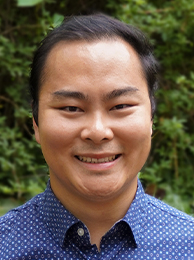HMEI announces HMEI-STEP Fellowship Awards to students to pursue environmental policy issues including high-impact responses to climate change and the freeing-up of cropland for reforestation
The High Meadows Environmental Institute (HMEI) has awarded HMEI-STEP Fellowships to Princeton University graduate students from the departments of ecology and evolutionary biology, atmospheric and oceanic sciences, chemical and biological engineering, and civil and environmental engineering.
Kelly Finke, Sofia Menemenlis, Matthew Sima, and Hansen Tjo each will receive two years of financial support and a $3,500 research award to explore the environmental policy dimensions of their graduate thesis research and pursue supplementary coursework. Upon completion of the program, the students will receive a certificate in Science, Technology and Environmental Policy (STEP).
The awarded students’ projects cover a range of topics including the creation of community-based systems that motivate university departments to pursue high-impact climate change policies; how tort law might need to evolve in response to increased flash flooding caused by climate change; the feasibility and implementation of policies and regulations aimed at mitigating PFAS or “forever chemicals”; and how using the whole corn plant — not just the corn kernels — to produce ethanol could reduce land use for agricultural purposes and free up areas for reforestation.
The HMEI-STEP program has supported more than 70 fellows since its founding in 2000. Profiles of this year’s fellowship recipients and descriptions of their projects are presented below.
Kelly Finke, Ecology and Evolutionary Biology


HMEI-STEP Adviser: Elke Weber, the Gerhard R. Andlinger Professor in Energy and the Environment and Professor of Psychology & Public Affairs
Thesis Topic: Cultural Evolution and Rapid Cultural Transitions
Thesis Adviser: Corina Tarnita, the Director, Program in Environmental Studies and Professor of Ecology and Evolutionary Biology
Finke will develop a Department Climate Pledge system to encourage university academic and administrative departments to self-select ambitious, high impact climate commitments through a community-based process. Tackling climate change requires massive cultural shifts at both the individual and institutional level, but research shows that managers often elect to pursue incremental, low-impact climate actions, despite the availability of higher-impact alternatives. Finke’s system will target academic departments, which at Princeton may or may not elect to implement sustainability-oriented best practices when organizing events, travel, and purchasing supplies. Finke will survey Princeton students and staff to assess their support for high-impact institutional policies such as reducing air travel and increasing plant-based food options at catered events. Then, Finke will use this information to develop a system to encourage implementation of such initiatives. Finke’s system will consist of two parts: an interactive digital interface that will allow departments to “build their own” pledges, and a community engagement toolkit to encourage best practices for productive departmental conversation around the pledge. The sustainability implementation guide will include pre-made tools such as a survey to assess priorities within the department community and a suggested timeline for gathering community insights and, ultimately, creation of a ‘pledge’. These tools primarily will assess departmental-level support for sustainability actions, thus helping faculty and administrators tap into the normative intentions of their students, and Finke suspects that this will encourage more progressive and ambitious goals. Finke will use an iterative process and pilot the toolkit within the EEB and SPIA departments to refine her tools. Her goal is to publish and promote the final toolkit product through the Association for the Advancement of Sustainability in Higher Education (AASHE).
Sofia Menemenlis, Atmospheric & Oceanic Sciences


HMEI-STEP Adviser: Michael Oppenheimer, Albert G. Milbank Professor of Geosciences and International Affairs and the High Meadows Environmental Institute
Thesis Topic: Precipitation Extremes and Tropical-Extratropical Interaction in a Changing Climate
Thesis Adviser: Gabriel Vecchi, Professor of Geosciences and the High Meadows Environmental Institute; Director, The High Meadows Environmental Institute; and Deputy Directory, Cooperative Institute for Modeling the Earth System
Menemenlis will investigate the role of tort in addressing risks and damages related to extreme precipitation, with a focus on New York City. As global temperatures rise, the frequency and intensity of extreme precipitation events is increasing. Many of the most extreme floods in the United States have been caused by extreme short-duration rainfall, also known as flash floods. In the United States, responsibility for managing flooding-related disasters is shared between federal, state, municipal, and private actors, and tort law is part of this policy landscape. Tort law allows residents affected by the flooding to seek financial relief by filing a water damage claim and may also incentivize careful behavior on the part of potential defendants. Defendants, however, often invoke the concept of a given weather event as an “act of God”, which implies that a precipitation event or flood was so extraordinary that it could not have been reasonably anticipated and prepared for. Climate change is making such extreme weather events more and more commonplace, but tort law in the United States largely relies on a body of past judicial precedent, so it is likely that there is dissonance between evolving scientific understanding and prior rulings. Menemenlis will use legal and historical archives to investigate how tort law has been used in scenarios involving damage from heavy rainfall events, and how scientific evidence has been invoked in such cases. Next, she will assess whether there are inconsistencies between current scientific knowledge and tort law to make policy proposals for how tort law should respond to a changing climate.
Matthew Sima, Civil and Environmental Engineering


HMEI-STEP Adviser: Denise Mauzerall, the William S. Tod Professor of Civil and Environmental Engineering and Public and International Affairs, School of Public and International Affairs
Thesis Topic: Investigating the Coupling of Feammox Process and PFAS Biodegradation in Batch Incubation and Constructed Wetland Mesocosms by Experiments and Modeling
Thesis Adviser: Peter Jaffé, the William L. Knapp ’47 Professor of Civil Engineering and Professor of Civil and Environmental Engineering
Sima will create policy evaluations and recommendations to better inform the development and implementation of future policy to regulate PFAS or “forever chemicals”, a category of over 12,000 chemicals that are widely used for their water repellent properties, chemical stability, and longevity but that pose threats to both human health and the environment. Sima will investigate current regulations and policies related to PFAS and analyze how industrial sectors that use PFAS would be impacted by their regulation. For each of several sectors — municipal water treatment plants and landfills, oil and gas production, aviation, the military, and manufacturers of household goods, textiles, construction, and cosmetics — Sima will conduct a cost-benefit analysis to investigate the impact of the proposed regulations and also determine each sector’s accountability in terms of reducing or remediating their use of PFAS. Using his technical expertise in PFAS remediation, Sima will identify optimal methods for detecting, removing, and destroying PFAS, both before and after they have entered the environment. Finally, Sima will evaluate proposed policies for PFAS regulation by interviewing government officials and reviewing Federal Registry documents to give formal comments and policy recommendations on how to best move forward with future PFAS regulations.
Hansen Tjo, Chemical & Biological Engineering


HMEI-STEP Adviser: David Wilcove, Professor of Ecology and Evolutionary Biology and Public Affairs and the High Meadows Environmental Institute
Thesis Topic: Advancing Genetic and Metabolic Engineering Strategies for Cellulosic Biofuels Production in Caldicellulosiruptor bescii
Thesis Adviser: Jonathon Conway, Assistant Professor of Chemical and Biological Engineering
Tjo will study how using the whole corn plant to produce ethanol, rather than just the corn kernels, could free-up land for conservation purposes. Generating ethanol as a biofuel is seen by many as an essential strategy to decarbonizing the United States economy, and nearly all ethanol is derived from corn. Current biofuel methods only utilize the starchy part of the corn, however researchers — including Tjo — are working to engineer bacteria that could convert corn leaves and stalks to ethanol, which would imply that less corn cropland would be needed to generate the same amount of ethanol. Currently, the United States uses over 90 million acres of land each year to grow corn; land that could otherwise be reforested and positively impact ecological biodiversity and the uptake of atmospheric carbon dioxide. Tjo will use models to examine which lands are least suited to ethanol production and the extent to which the used lands are best suited for reforestation. Then, Tjo will explore what biodiversity criteria would be important for navigating cases with severe trade-offs. Finally, Tjo will analyze the USDA’s Conservation Reserve Program as a model for how policy incentive programs can encourage farmers to cede land for conservation purposes, focusing on the potential long-term economic effects.




